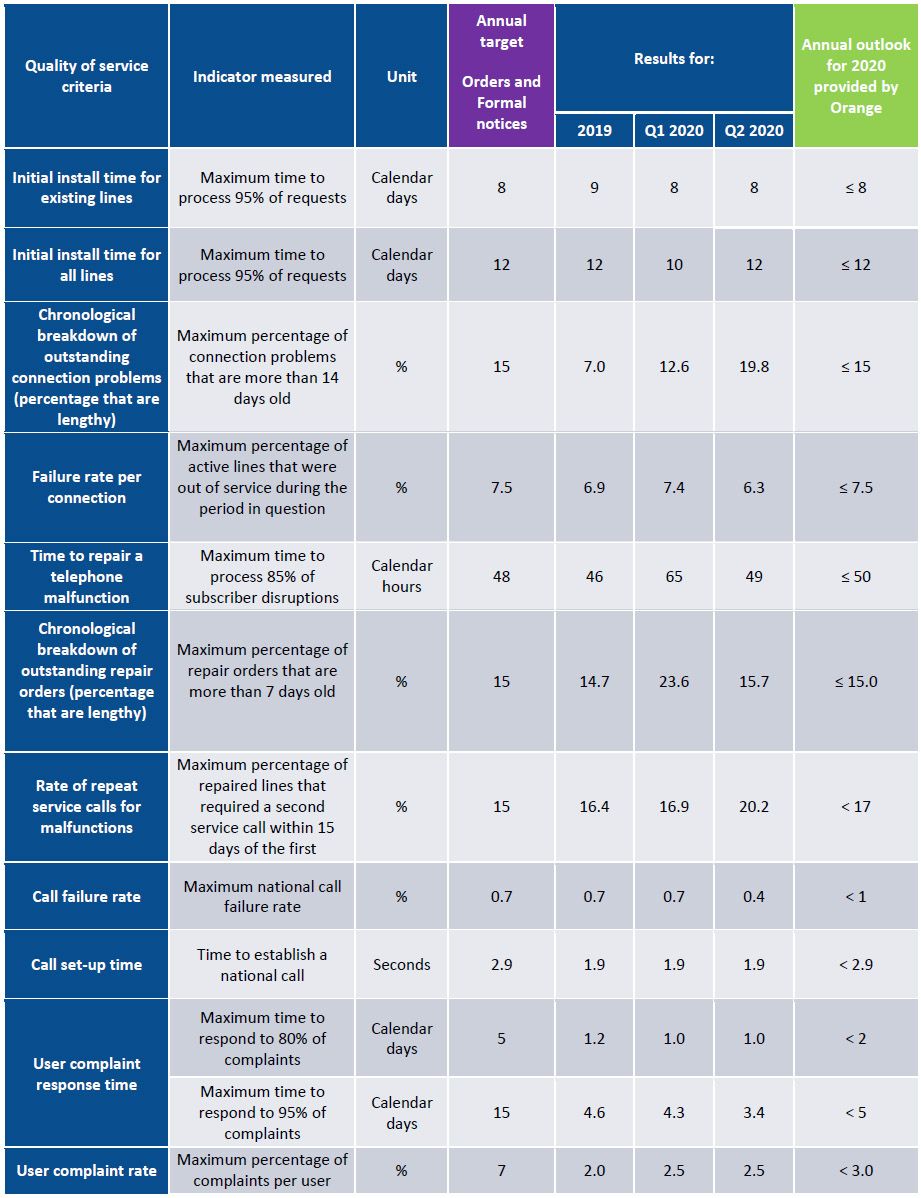In an October 2018 Decision, Arcep issued Orange with a formal notice to comply with its quality of service obligations with regard to the universal service. Today, the Arcep Executive Board body responsible for settling disputes, legal proceedings and investigations (RDPI) is delivering a scorecard on changes in the quality of service (QoS) that have been observed, and publishing information on this matter provided by Orange.
Obligations imposed on Orange in its capacity as the universal service operator: 12 annual QoS indicators
In an Order dated 27 November 2017, the Minister for the Economy and Finance designated the company Orange as the operator responsible for providing a fixed telephone plan that is part of the universal service, and this for a period of three years. This universal service, whose purpose is to guarantee that everyone in France has access to telephone services at an affordable price, is subject to a set of specifications established by the Government. Some dozen quality of service indicators listed in the specifications have quantified annual thresholds with which Orange must comply, and which Arcep is responsible for monitoring.
Large number of complaints of a significant decline in quality; an investigation opened in June 2018
In 2018, a significant number of users and local authorities reported to Arcep – notably via the “J’alerte l’Arcep” platform – a substantial decline in the quality of the fixed telephone service. Arcep also received reports from several prefects, members of Parliament and by France’s national “Defender of Rights” (Défenseur des Droits). The investigation launched in June 2018 by the Arcep Executive Board body responsible for settling disputes, legal proceedings and investigations (RDPI) made it possible to confirm a particularly significant decline in the quality of the universal service. In light of these elements, Arcep’s RDPI body decided to issue Orange with a formal notice, on 23 October 2018, demanding that it comply in 2019 and 2020 with all of the annual indicators that were set when it was designated as the operator responsible for providing the universal service.
Following this formal notice to comply, Arcep observed a significant improvement in the quality of the universal service in 2019. The situation was less satisfactory in the first quarter of 2020, which was marked by the public health crisis.
After this formal notice to comply was issued, quality of service indicators improved substantially, and virtually all of them exceeded the annual targets that the Minister had set for 2019. To give one example: 85% of outages were repaired within 46 hours in 2019, compared to the target turnaround time of 48 hours, which is a clear improvement over the 62 hours observed in 2018.
Arcep nevertheless ascertained a decline on certain indicators in Q4 2019 and Q1 2020. In the second quarter of 2020, which was heavily affected by the Covid-19 crisis, some indicators worsened significantly, whereas others showed a clear improvement.
Orange presented Arcep’s RDPI body with the outlook for restoring quality of service in the second half of 2020. The RDPI has taken note and is making this outlook public.
The public health crisis that France has been experiencing since March 2020 has had inevitable consequences for electronic communications operators’ businesses, and notably for the quality of the universal service. On 17 July, Orange presented Arcep with an assessment of these consequences, and the outlook for improving the quality of the universal service up to the end of 2020. For the sake of transparency, Arcep is publishing that information today.
Arcep’s RDPI body has taken note of the outlook for the second half of 2020 submitted by Orange, which is part of an ongoing commitment to improving the quality of the universal service, and a return to the levels set by the ministerial Order designating Orange the universal service operator. Arcep’s RDPI body will pay particularly close attention to how the situation evolves with respect to the procedure and will take into account the achievement of this trajectory that is currently underway.
Arcep Executive Board: Plenary body, Body responsible for settling disputes (RDPI), restricted body
ARCEP’s Executive Board has three distinct bodies. Theplenary body is composed of the seven members of the Executive Board. A body referred to in French as “RDPI”, composed of four of the seven of the Executive Board members, including the Chair, is responsible for investigations and legal proceedings (initiating a preliminary investigation procedure, issuing formal notices, notifying the statement of objections). Lastly, the so-called “restricted” body, which is composed of the three remaining members of the Arcep Board, is responsible for issuing rulings, which includes deciding whether or not to impose penalties.
Annex: Indicators for the first two quarters of 2020 and annual outlook for 2020 provided by Orange

Associated documents
- Order of 27 November 2017, (quality of service obligation for the universal service operator, detailed information on the indicators)
- Decision No. 2018-1276-RDPI, (regarding the formal notice issued to Orange to comply with its obligations regarding the universal electronic communications service)
- Orange presentation: “Qualité de service de l’offre de Service Universel” (Universal service QoS) (pdf - 341 KB)
